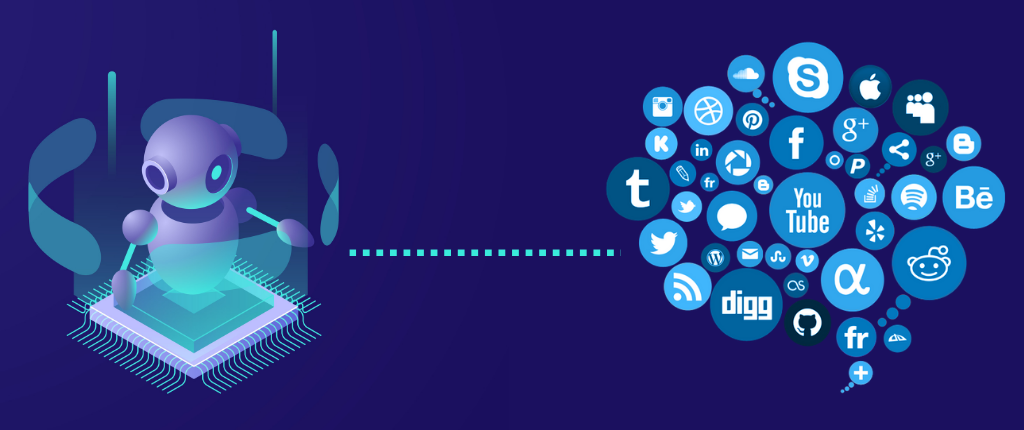How Artificial Intelligence is shaping content marketing

In more than one way, AI has already made an influential presence in digital marketing. As part of digital marketing strategy, content marketing has also been a beneficiary of the artificial intelligence (AI) technology. But as of now, the influence has been limited to a few aspects, like content marketing strategy, content recommendations based on personal preferences, etc. There is actually a lot more to come within a span of a few years from the increasing collaboration between content marketers and the AI-powered content marketing tools.
With so many changes AI can bring us, we need to take a comprehensive look at the entire influence of artificial intelligence on content marketing. Before we go deeper into finding these influences, let's share a few words on artificial intelligence and on how it works.
What exactly is artificial intelligence?

Artificial intelligence is a domain of computer science that mimics human intelligence and reasoning in work and responses. Some of the key activities and areas of expertise that come under the broader specialty of artificial intelligence include the following:
- Speech recognition: The ability to recognize a voice by decoding various factors like the tone, voice modulation, chosen vocabulary, mode of speech, etc.
- Machine Learning: A computer program learns from user behavior and over a period of time adjusts activities and responses to the preferences and needs of the user accordingly.
- Data analysis and planning: Based on data analysis, certain user needs and activities can be predicted and user-focused plans can be created to boost engagement accordingly.
- Problem-solving: AI-powered solutions can handle problem-solving tasks in the same way that humans solve problems through analytical reasoning coupled with data-driven insights about real-time situations and contexts.
Let's explain how AI works in real-life contexts with various applications. Autonomous cars are a great example of AI-powered computing taking over something that is handled by human cognitive and reasoning abilities. Personalized product recommendations by Amazon to its millions of customers is also the outcome of Machine Learning, which is a subset of AI skills. The way Netflix and YouTube adjust content recommendations based on earlier user behavior and preferences is also an example of how AI works. AI continues to equip machines to learn from human interactions and use this knowledge to perform tasks in a human-like fashion.
Content Marketing and Artificial Intelligence
If you think about the amount of time a content marketing team spends on repetitive content marketing and research activities, you will realize how beneficial it would be to handle all these tasks by machine intelligence. From discovering keywords to researching and planning blog post topics, to creating great content, to scheduling social sharing, there are all sorts of tasks where intelligent computing programs can play an effective role alongside humans. For example, beyond marketing, AI is also transforming how companies optimize development processes with AI to boost efficiency and cut repetitive work.
What happens if all these tasks are handled by a machine algorithm where all you need to do is to enhance the output rather than create content from scratch? Well, that's what the promise of artificial intelligence and Machine Learning in content marketing is all about. With AI used in content marketing activities, a lot of time from the daily work schedule of a marketer is freed up and this time can further be used for other valuable activities.
Artificial intelligence is a proven way to make machines smarter and more sensitive to contexts and evolving human needs. It is no wonder that AI working alongside human intelligence helps to enhance human capabilities and knowledge. AI is an umbrella term that accommodates various technologies with different capacities and levels of maturity. All these technologies like deep learning, neural networks, machine learning, natural language processing (NLP), and natural language generation (NLG) can deliver impressive output with content strategy and content creation.
How an AI content marketing assistant Lucy works
Now we have a fully equipped AI marketing assistant like Lucy from IBM Watson that can impact content marketing to a great extent. Lucy comes as a highly powerful tool that can be used by marketers for the purpose of audience segmentation, content research, and planning. The best thing about Lucy is that it delivers an output of a big content marketing team working for a whole month in just a few minutes.
Lucy is capable of absorbing and analyzing a huge volume of company-owned data and, after the absorption is complete, it is capable of answering any questions of varying levels of complexity in just a minute. As for content marketers, it can help to make up a content strategy by answering the following questions:
- Which geographic regions the content marketers should target first?
- What kind of content mix will be ideal for the target audience?
- What kind of competition from other content marketers is it going to face?
- What are the key personality traits of the target audience?
Asking such questions is important for anyone who wants to come up with a highly effective content strategy. Without the help of an AI assistant like Lucy, finding the answers to these questions is not so simple. Lucy is a great tool to absorb and interpret a large volume of data to answer these questions.
Apart from helping you with the right content strategy, other things that marketing assistant like Lucy can do include the following:
- AI-powered assistants can build clearly defined audience segments with complex behavioral attributes and help you to create personalized content for them.
- You can try different content marketing strategies and evaluate their outcomes.
- AI-powered systems decrease time and effort for content marketing tasks to a minimum, which helps to make content solutions more affordable.
Use cases for AI in content marketing

Let's now understand the impact of AI on content marketing with some specific use cases and examples.
Scaling up content creation
Creating content instantly with AI-powered commercial systems is already possible. Drafting an email and making a copy of an ad without active human involvement is already possible, too. AI-powered systems are evolving for long term copywriting tasks. This will have huge implications on the content strategy of the companies in the future.
Intelligent content strategy
A vast majority of content marketers still listen to their instincts when coming up with a content strategy. But human instincts, however insightful, can't analyze a huge amount of data. AI-powered tools that provide data-driven insights mitigate such human limitations.
AI to boost search optimization
To get the most out of the content in terms of audience engagement, you need to pay attention to SEO. Since major search engines like Google, Facebook, and other content platforms basically depend on artificial intelligence, AI-powered systems can play a great role in optimizing content before and after the publication to ensure better search results.
AI-powered systems can help the following tasks for search engine optimization:
- Content research
- Content topic suggestion
- Brand compliance throughout assets
- Delivering contents based on user intent
Personalization of content
Initially, AI was mainly used to make recommendations to the audience based on what they like. This is what we see with the product recommendations on Amazon and content recommendations on Netflix. Naturally, this core strength of AI systems is going to be a mainstay in the content marketing of the future. Most of these systems are capable of learning about the audience based on user activities, user behavior, and user intent expressed in a myriad of ways.
AI-based content marketing applications
Since AI in content marketing has already gained ground with many AI companies offering their services for content marketing, AI tools for content creation and marketing are increasingly getting common. Let's have a brief look at some of these AI-based content marketing tools.
- BrightEdge is an AI-powered SEO and content marketing service. Its specialty is discovering search intent, audience-specific content creation, and evaluating content performance.
- Concurred is another AI-based content research and marketing tool that helps marketers to boost engagement and find topics that need to be written at a given point of time. Besides topic research, it also helps marketers with content audits, performance tracking and content promotion.
- Crayon is another AI-powered content tool that provides detailed intelligence and insights about what the competitors are doing online. It also provides insights into the content strategy of your competitors by showing how their content and web pages change over time.
- MarketMuse is another great AI-based content marketing assistant, which is specifically preferred for topic research.
It won't be wrong to say that the future of content marketing is intertwined with the AI-powered content tools and evolving AI capabilities in content research, personalization, and creation. So far, AI has made big progress in influencing and shaping content marketing and strategy. In the years to come, this influence will be more robust with far-reaching consequences.













